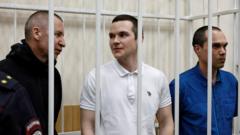In a recent verdict, three lawyers, Vadim Kobzev, Igor Sergunin, and Alexei Liptser, were sentenced to prison terms ranging from three-and-a-half to five-and-a-half years for allegedly participating in an "extremist organisation" linked to the late opposition leader Alexei Navalny. Their trials, conducted in secrecy, further underscore the Russian government's intensifying persecution of those associated with Navalny, who died under contentious circumstances in February.
Sentencing of Navalny's Lawyers Reflects Ongoing Repression in Russia

Sentencing of Navalny's Lawyers Reflects Ongoing Repression in Russia
Three lawyers who represented the late Russian opposition leader Alexei Navalny have been sentenced to prison, highlighting the state's crackdown on dissent.
---
Three lawyers who previously represented the late Russian opposition leader Alexei Navalny have faced substantial prison sentences in a move that has drawn widespread condemnation. Vadim Kobzev received a five-and-a-half-year sentence, Alexei Liptser was given five years, and Igor Sergunin, who admitted to the charges, was sentenced to three-and-a-half years.
These convictions are tied to the lawyers' alleged involvement with what Russian authorities described as an "extremist organisation," with accusations centered on their communications with Navalny while he was imprisoned in an Arctic penal colony, following his 2021 arrest after returning to Russia from Germany. This case mirrors past Soviet-era tactics, as noted by Navalny himself, and signifies a troubling descent for the rule of law in the country.
The three lawyers’ trial, held behind closed doors in Petushki, has evoked an outcry from human rights organizations, with Amnesty International stating that targeting legal representatives jeopardizes the fundamental right to a defense. Ivan Zhdanov, a key figure in Navalny’s Anti-Corruption Foundation, highlighted the suspicious timing of their sentencing on the anniversary of Navalny’s own arrest, insisting that this was not a mere coincidence.
Yulia Navalnaya, Navalny's widow, has referred to the lawyers as political prisoners, demanding their immediate release. Other supporters of Navalny, who have also faced threats and harassment, condemned the sentences as a blatant misuse of judicial power that aims to stifle any remaining dissent in Russia.
Navalny's tragic death in February at the age of 47 in a remote penal colony, officially attributed to "sudden death syndrome," has further fueled accusations against the Kremlin. His passing, alongside the sentencing of his legal team, paints a grim picture of the ongoing efforts by the Russian government to quash opposition voices and intimidate those attempting to fight back against autocratic rule.
Three lawyers who previously represented the late Russian opposition leader Alexei Navalny have faced substantial prison sentences in a move that has drawn widespread condemnation. Vadim Kobzev received a five-and-a-half-year sentence, Alexei Liptser was given five years, and Igor Sergunin, who admitted to the charges, was sentenced to three-and-a-half years.
These convictions are tied to the lawyers' alleged involvement with what Russian authorities described as an "extremist organisation," with accusations centered on their communications with Navalny while he was imprisoned in an Arctic penal colony, following his 2021 arrest after returning to Russia from Germany. This case mirrors past Soviet-era tactics, as noted by Navalny himself, and signifies a troubling descent for the rule of law in the country.
The three lawyers’ trial, held behind closed doors in Petushki, has evoked an outcry from human rights organizations, with Amnesty International stating that targeting legal representatives jeopardizes the fundamental right to a defense. Ivan Zhdanov, a key figure in Navalny’s Anti-Corruption Foundation, highlighted the suspicious timing of their sentencing on the anniversary of Navalny’s own arrest, insisting that this was not a mere coincidence.
Yulia Navalnaya, Navalny's widow, has referred to the lawyers as political prisoners, demanding their immediate release. Other supporters of Navalny, who have also faced threats and harassment, condemned the sentences as a blatant misuse of judicial power that aims to stifle any remaining dissent in Russia.
Navalny's tragic death in February at the age of 47 in a remote penal colony, officially attributed to "sudden death syndrome," has further fueled accusations against the Kremlin. His passing, alongside the sentencing of his legal team, paints a grim picture of the ongoing efforts by the Russian government to quash opposition voices and intimidate those attempting to fight back against autocratic rule.



















